
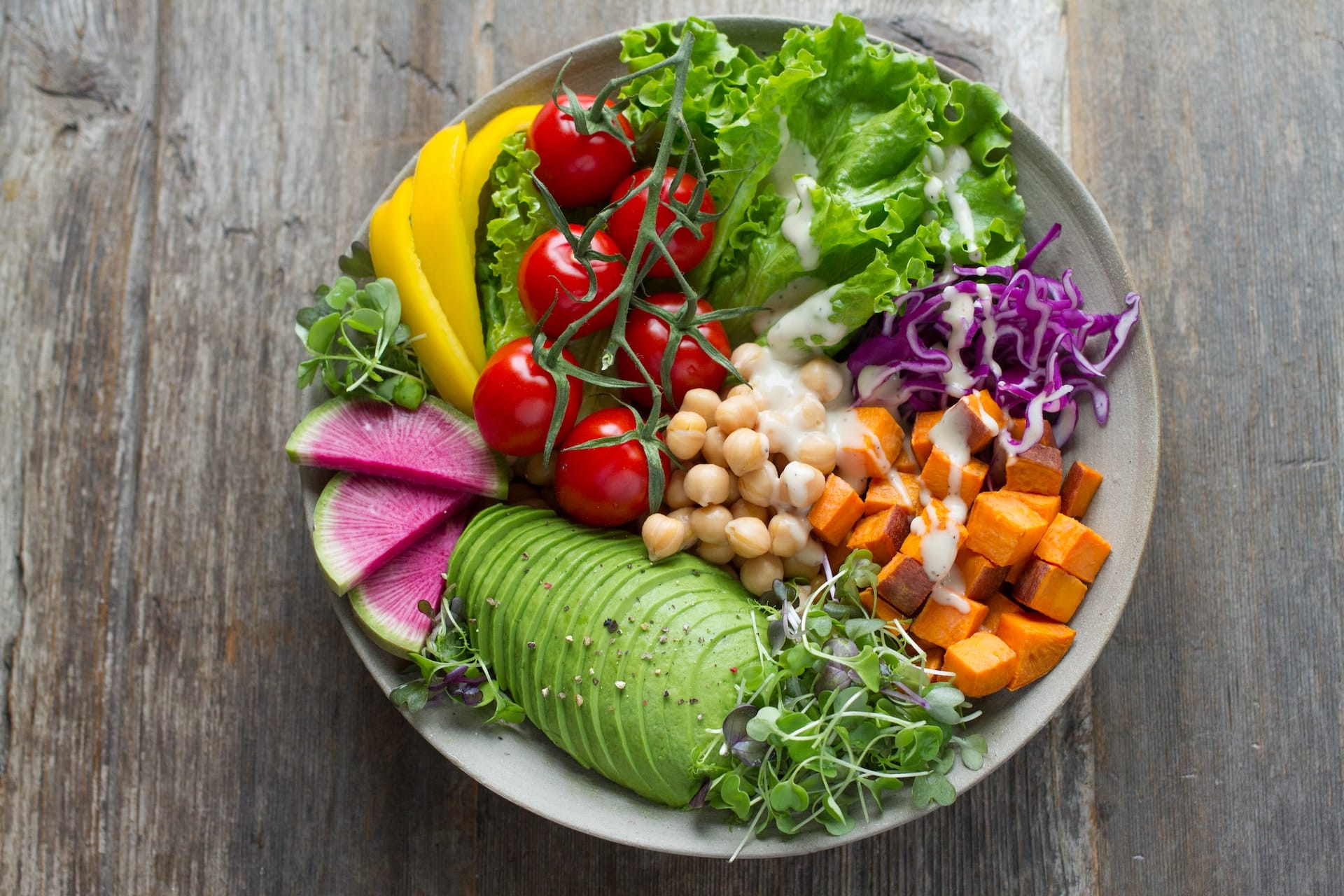
Plant-based diets, coming in “flavors” ranging from strict veganism to a “minimal animal protein” diet, are all the rage right now. One glance at a Netflix menu these days brings up numerous documentaries promoting plant-based eating, and news outlets publish articles almost daily praising the benefits of plant-based eating.
Not surprisingly, the abundance of information about plant-based eating hasn’t gone unnoticed by runners. My clients who are runners increasingly ask me whether they should eat a plant-based diet. Unfortunately, what seems like a simple question does not have a simple answer!
While I am 100% for eating a plant-rich diet (and encourage all of my clients to do so!), I am not a proponent of a plant-based diet for everyone, and certainly not for every runner. Whether or not you should eat a plant-based diet as a runner is a nuanced discussion; unfortunately, nuance is largely missing from the mainstream media messages about plant-based diets.
Therefore, in this blog, I discuss the pros and cons of a plant based diet for runners so you can make an informed decision about whether to embark on this type of diet, and maximally support your health and running performance in the process.
Please note that I am an affiliate for some of the products I’ve linked to in this post. If you click the link here and make a purchase, I may earn a commission at no extra cost to you.
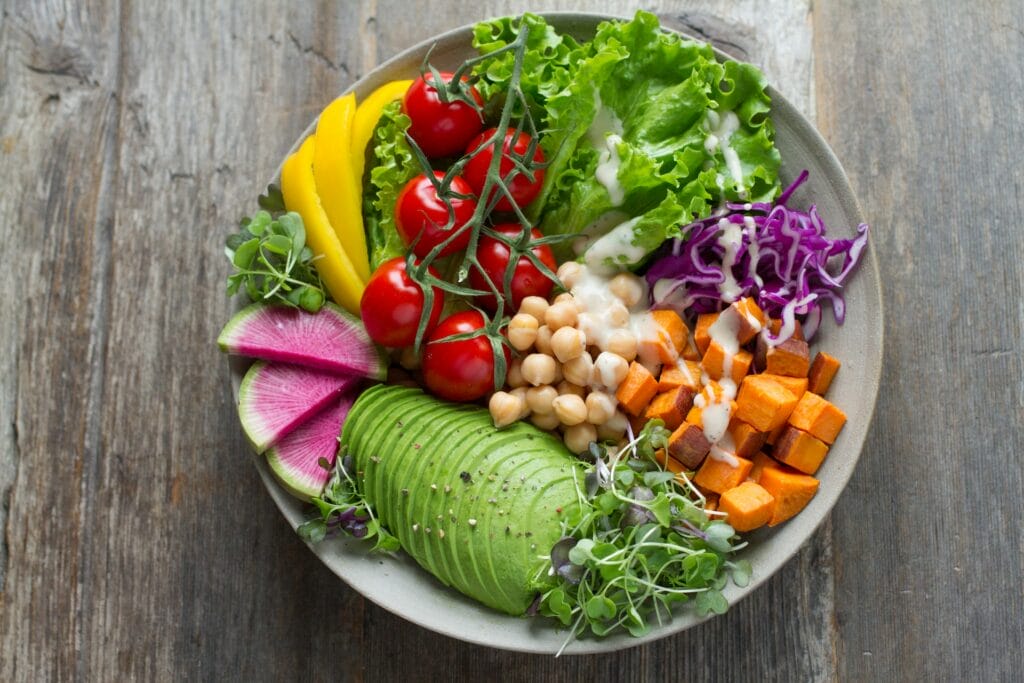
There’s no single definition of a “plant-based diet.” For some, a plant-based diet means eating a strict vegan diet (no animal products of any kind, including meat, poultry, seafood, eggs, dairy products, or even honey). For others, a lacto- ovo- vegetarian or pescatarian diet is considered “plant-based.”
Still, for others, a plant-based diet simply means eating very little animal protein (like eating a piece of chicken twice a week or a piece of red meat once a week) and otherwise focusing on eating predominantly plants.
Therefore, plant-based diets exist on a spectrum, and they are not all created equal. For example, a pescatarian diet (which includes certain nutrients one cannot get on a strict vegan diet) is more likely to meet the nutritional needs of runners long-term than a strict vegan diet, in my clinical experience.
In addition, a “junk food” vegan diet filled with processed meat alternatives, lots of bread and pasta, and few vegetables is technically “plant-based,” but is unlikely to support optimal health or running performance.
If you are a runner, there are multiple potential benefits to including plenty of plant foods in your diet. Let’s talk first about the potential benefits of a plant-based diet for runners because delving into the potential cons.
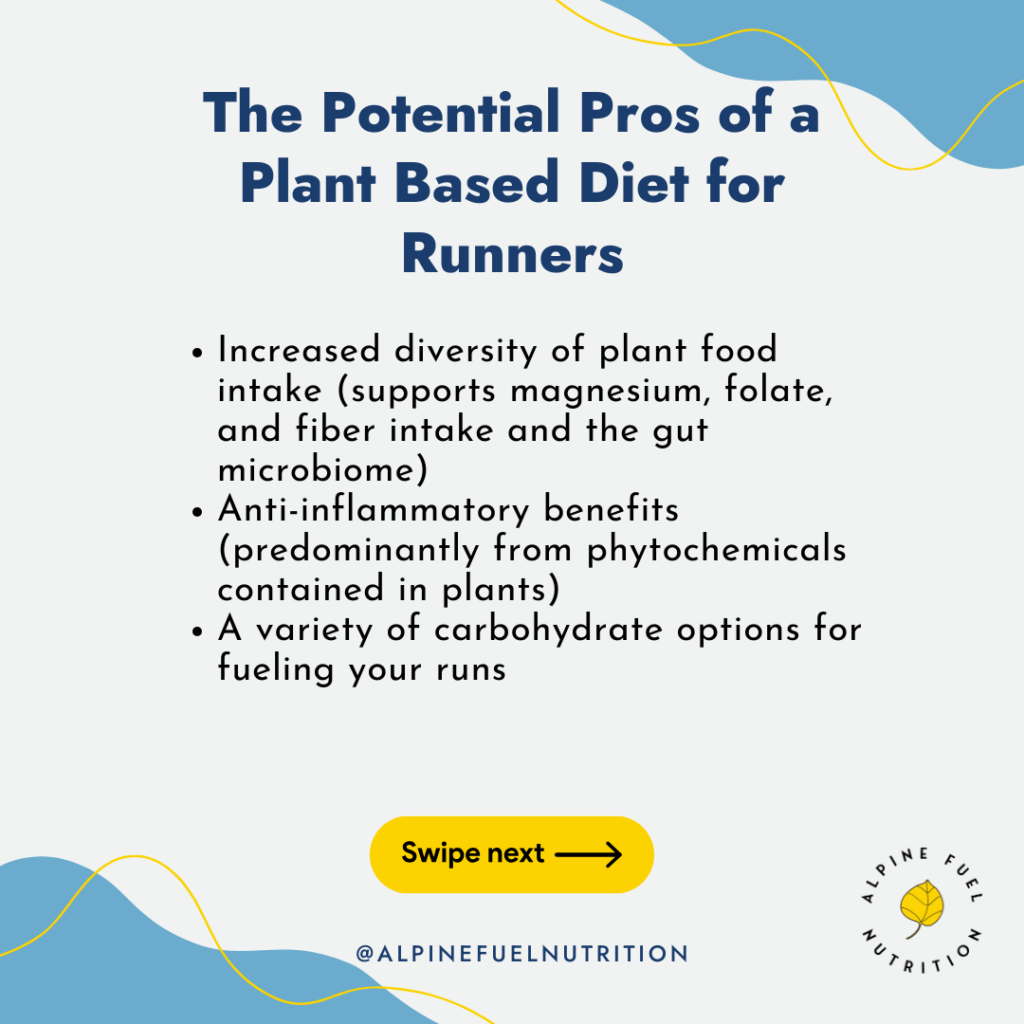
One of the undisputed benefits of a plant-based diet is that it (usually) increases the diversity of plant foods in one’s diet. Eating a diverse array of plant foods is associated with a healthy gut microbiome. A healthy gut microbiome, in turn, may influence running performance. (Source, Source)
Eating a variety of plant foods may offer anti-inflammatory effects, predominantly because of the phytochemicals found in plant foods. This is particularly important for endurance athletes like runners, who must keep inflammation in check to perform athletically and recover properly from training. (Source)
Examples of plant foods with notable anti-inflammatory properties include:
Runners must include an appropriate amount of carbohydrates in their diets to fuel their physical activity. Plant-based diets rich in vegetables, fruits, starchy tubers (like sweet potatoes), legumes, and whole grains provide an abundance of carbohydrate options for runners.
The trick is to figure out how much carbohydrate you need as a runner and how to balance carbs with protein and fats in your diet! A sports nutritionist can help you determine how to achieve a healthy balance of carbs, protein, and fat uniquely suited to your needs.
Many runners are thoughtful people who care deeply about animals and the environment. Therefore, this article wouldn’t be complete with at least briefly discussing the ethical and environmental aspects of a plant-based diet.
Many people claim they want to eat a plant-based diet for animal welfare. I totally get that! In fact, I was a vegan and vegetarian for years for ethical reasons. However, I have some concerns about eating plant-based for animal welfare sometimes hurting peoples’ own health and welfare. Hear me out:
Regarding the ethical implications: While I completely respect a runner’s decision not to eat any animal foods for animal welfare, I would also encourage you to think about your welfare (health and well-being) as it relates to what you eat over the long term. I’ve worked with too many runners who are plant-based and struggling with nutrient deficiencies, injuries, and other health problems related to diet that I can’t help but mention this piece.
A pattern I’ve observed among hundreds of clients is that many who are plant-based (especially vegan), ultimately need to return to a omnivorous diet for their own welfare because their health is suffering from nutrient inadequacies caused by the strict plant-based diet.
Regarding the environmental impact of plant-based diets, I am certainly no expert on this topic. However, I have done a decent amount of research and I am not convinced that a vegan or heavily plant-based diet is the best option for environmental health. When we look beyond the surface level at the impact of plant-based diets on monocrop agriculture, reduction of plant biodiversity, and ignore the crucial roles that animals (such as grazing ruminants) play in environmental health, the purported benefits of a plant-based diet on our environment become quite tenuous.
I am not going to go down the “plant-based diet/environmental” rabbit hole. However, I will point you in the direction of a few resources that you may peruse if interested:
Eating a variety of vegetables, fruits, nuts, and other plant foods is vital for your health. However, an exclusively or heavily plant-based diet with little to no animal foods carries some potential health risks. Let’s discuss six potential cons of a plant based diet for runners.
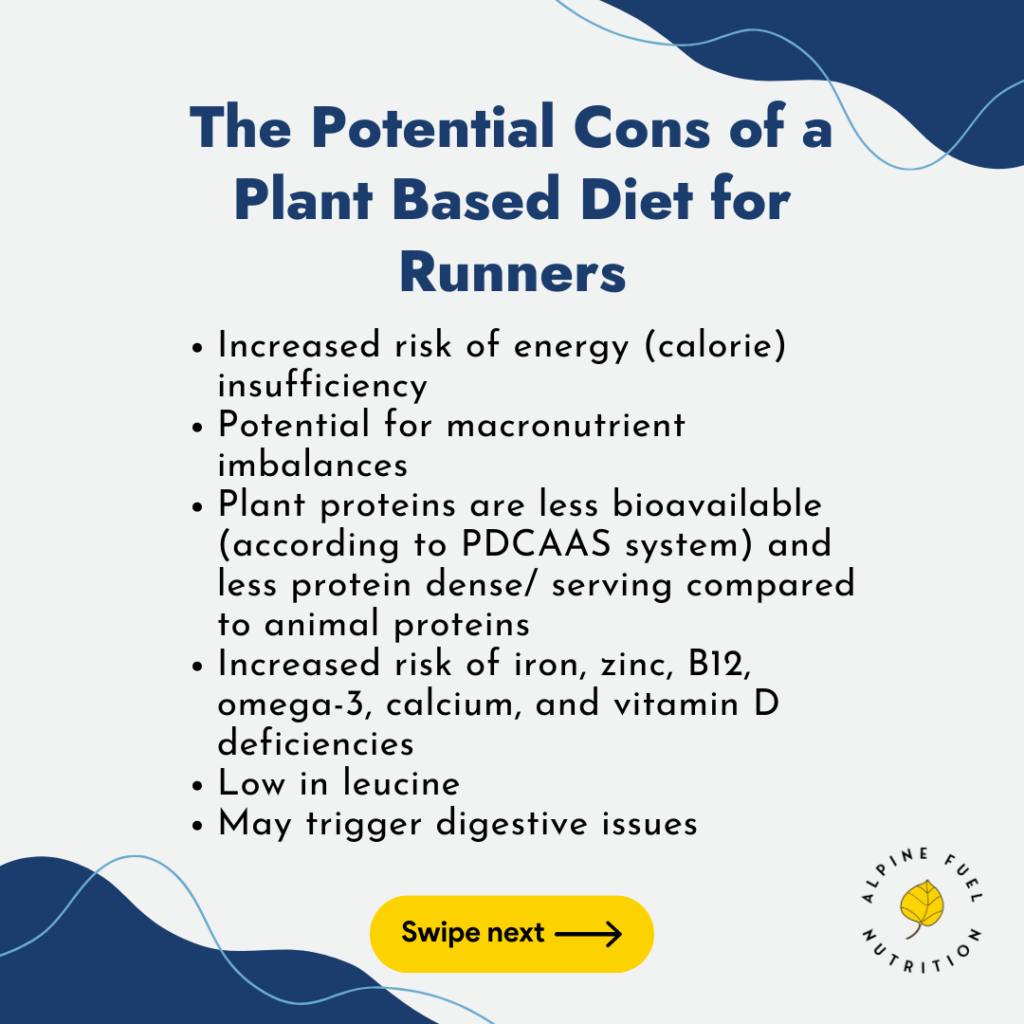
Research shows that athletes eating a plant-based diet are at risk of experiencing energy (calorie) insufficiency. (Source, Source)
Over time, consuming insufficient calories as a runner can cause RED-S (Relative Energy Deficiency in Sport), a syndrome where health and athletic performance decline because the body is not getting enough fuel to support the demands of daily life and training.
Our diets provide three main macronutrients: Protein, carbs, and fat. When these dietary macronutrients are balanced, we experience stable energy, healthy blood sugar control, maintain a healthy weight, and perform well as runners.
Conversely, when our macronutrients are skewed (usually in runners, macronutrients skew toward too many carbohydrates and not enough protein), you may experience blood sugar imbalances leading to frequent “bonking” during runs, unstable energy throughout the day, and unfavorable changes in body composition, namely an increase in body fat.
By their very nature, plant-based diets tend to be high in carbohydrates from grains and legumes and low in protein (read the next section about protein density in plant proteins).
When you look at the primary protein sources in an exclusively plant-based diet and compare the amount of protein in those foods with the amount of protein in animal foods, you can quickly see that plant foods are less protein-dense; in other words, you need to eat a LOT of them to consume adequate protein:
In addition, the proteins in plants are less bioavailable, meaning they’re not as well absorbed or utilized by the body as animal proteins. As a runner, your body needs bioavailable protein to maintain muscle mass and bone density, create proteins for your immune system, and help you recover from and adapt to your training. If you’re eating a primarily plant-based diet with very few animal proteins, you risk experiencing protein inadequacy, which may compromise your training.
Poorly planned plant-based diets, and especially vegan diets, can increase the risk of numerous nutrient deficiencies, including deficiencies of:
In my experience, strict vegans run the most significant risk of nutrient deficiencies. Plant-based eaters who are lacto-ovo-vegetarians, pescatarians, or who simply eat animal proteins sparingly are less at risk, in my experience. However, they are still at risk for these nutrient deficiencies.
If you’re a runner eating a plant-based diet and experience deficiencies of these nutrients, you run the risk of experiencing bone stress injuries from insufficient vitamin D and calcium, anemia from low iron or vitamin B12, immune dysfunction (also from low vitamin D), and fatigue (especially from low B12).
(Source)
The potential nutrient insufficiencies or deficiencies triggered by a plant-based diet may necessitate supplementation, especially in runners already using their nutrient stores more rapidly than the average person.
If you are a plant-based runner, you should only supplement after testing your nutrient levels first. Please see the “Additional Considerations” section below for information about nutritional labs runners should do at least once a year.
Once plant-based runners know their nutrient levels, many will find they must supplement with vitamin D, iron, omega-3 fatty acids, and vitamin B12 long-term to maintain their levels. Conversely, a runner eating an omnivorous diet with a healthy balance of these nutrients may be less likely to need supplementation.
Another problem with a plant-based diet, especially a vegan diet, is that it is low in a critical amino acid called leucine. Leucine is necessary for muscle protein synthesis (MPS), the process of producing new muscle protein. Just like any other athlete, runners need adequate leucine in their diets to build muscle (if that is a goal) or simply to maintain muscle mass. (Source)
The top dietary sources of leucine are red meat, poultry, eggs, seafood, and dairy products. Soy products are one of the few plant proteins that contain an appreciable amount of leucine.
The lack of leucine in plant-based diets may be particularly detrimental to older runners because as we age, the amount of leucine our bodies need to stimulate MPS increases. In other words, as you age, you should prioritize leucine-rich proteins such as meat, poultry, and seafood, not deprioritizing them on a no- or low-animal-protein diet. If you fail to consume enough leucine as an older runner, you may have difficulty maintaining muscle and may lose significant amounts of muscle through a process called sarcopenia. (Source, Source)
Frankly, a plant-based diet can cause digestive issues for some runners! The high fiber content and, sometimes, the presence of other potential gut irritants, such as gluten, in a plant-based diet, can drive digestive distress – gas, bloating, diarrhea, and constipation – in some runners.
If you’re eating a plant-based diet and routinely experiencing digestive distress in your daily life or during your runs, it may be time to reconsider the balance of plant-to-animal foods in your diet.
Whether you’re a plant-based runner or a runner who eats a balance of animal and plant foods, you should get bloodwork done at least once a year to check your nutritional status. You can ask your doctor to add these labs to your annual physical or work with a sports nutritionist for more individualized nutrition testing and support.
Here are the nutritional labs that every runner should get tested at least once a year:
I am 100% for runners eating lots of plants! However, I encourage all runners to consider the pros and cons of a plant-based diet before drastically reducing or removing animal foods from their diets.
In my nutrition practice, I’ve found that most runners do best eating a balance of plant and animal foods. In my blog, Trail Running Nutrition: How to Fuel Your Body to Feel and Perform Your Best, you can read specifically about the balance of foods I recommend trail runners eat.
As a runner, I eat at least 5 servings of vegetables daily. I also eat a variety of fruits, nuts, and seeds, but I balance these plant foods with animal proteins like meat, poultry, and fish so that I can optimize the nutrient density of my diet, experience high energy each day, and keep my gut happy.
Your decision about whether or not to eat one of the variations of a plant-based diet should be based on your unique food preferences, health concerns, and health and performance goals. Just keep in mind that no single diet works for every runner! You need to find what works for you.
The content provided on this nutrition blog is intended for informational and educational purposes only. It is not a substitute for professional medical advice, diagnosis, or treatment. Always seek the advice of your physician or other qualified health provider with any questions you may have regarding a medical condition. Never disregard professional medical advice or delay seeking it because of something you have read on this blog.
The information and recommendations presented here are based on general nutrition principles and may not be suitable for everyone. Individual dietary needs and health concerns vary; what works for one person may not be appropriate for another.
I make every effort to provide accurate and up-to-date information, but the field of nutrition is constantly evolving, and new research may impact dietary recommendations. Therefore, I cannot guarantee the accuracy or completeness of the information presented on this blog.
If you have specific dietary or health concerns, please consult a qualified nutritionist or another healthcare professional for personalized guidance.
I empower others through nutrition to conquer their mountain adventures, drawing from my own experiences.
With a background in Biomedical Science and an M.S. in Human Nutrition, I’m a Certified Nutrition Specialist and Licensed Dietitian Nutritionist. My journey in functional medicine has equipped me to work alongside athletes and tackle complex health cases. As a passionate trail runner, backcountry skier, and backpacker, I strive to support others on their paths to peak performance and well-being.




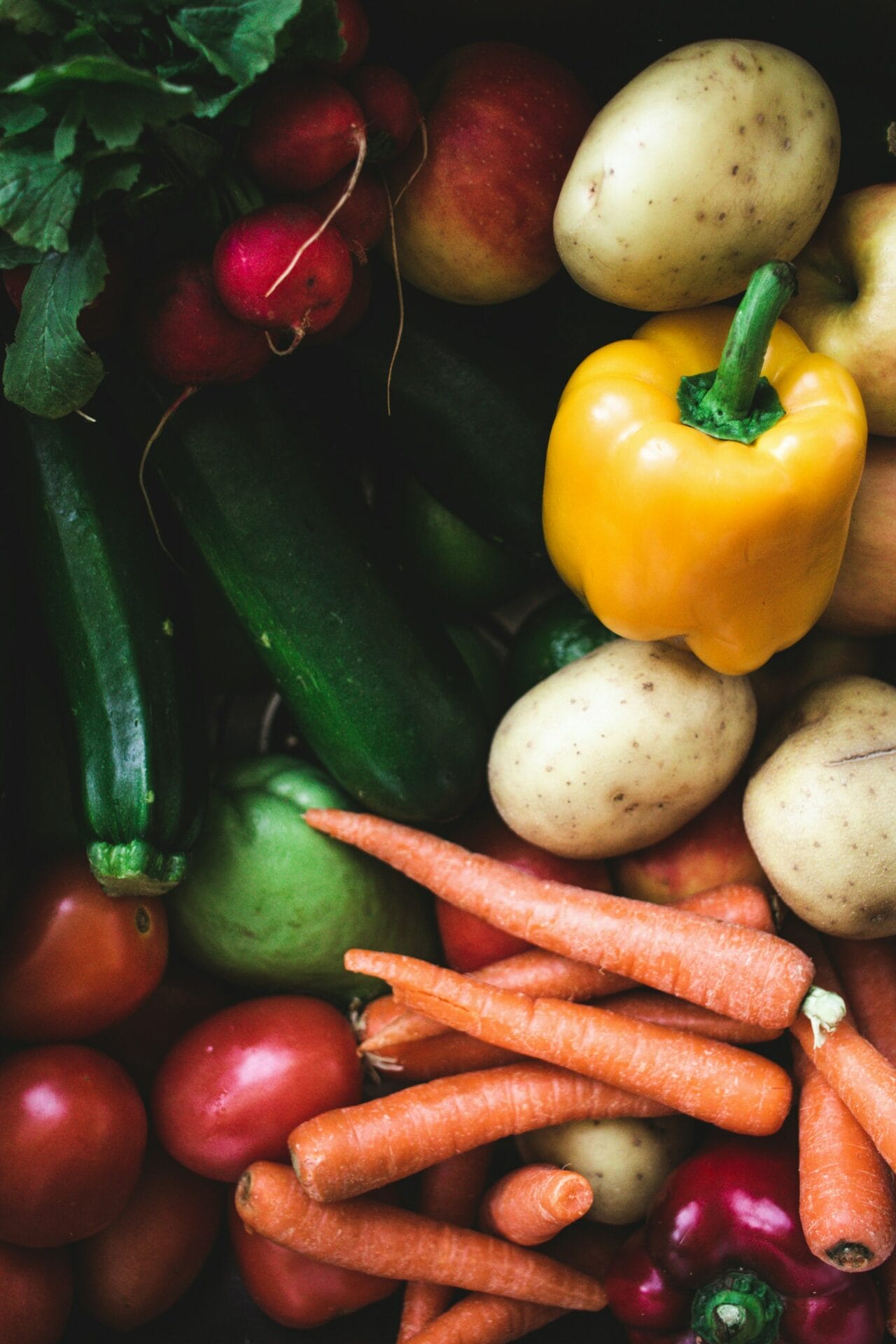



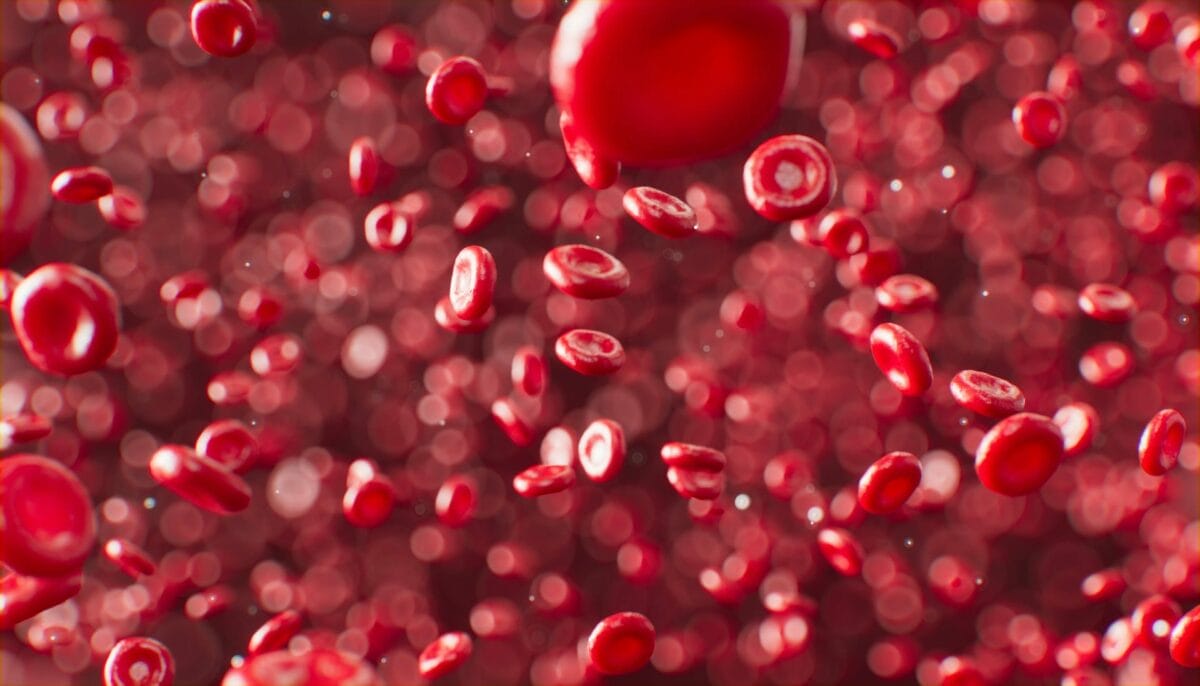
Sign up for updates that come right to your inbox.